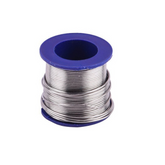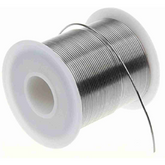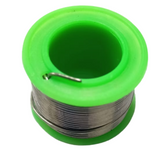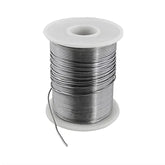-
NOEL SOLDER WIRE 60/40 - 50GM PACKNOEL SOLDER WIRE 60/40 - 50GM PACK NOEL Solder Wire 22 SWG Grade 60/40 is a high-quality soldering material designed specifically for electronics applications. This 50gm pack features the industry-standard 60% tin and 40% lead composition, offering the perfect balance between durability and ease...
- Rs. 219
Rs. 244- Rs. 219
- Unit price
- per
Save Rs. 25 -
Solder Wire-1 Meter (10gm)Solder Wire-1 Meter (10gm) These solder wires are manufactured from high-quality Lead Solder Wire. This soldering iron wire has good solderability, insulation resistance, no spattering and is non-corrosive. Excellent Electrical Conductivity and Thermal Conductivity, Good Solder ability. We make sure to provide the best...
- Rs. 39
Rs. 49- Rs. 39
- Unit price
- per
Save Rs. 10 -
Soldering Wire 90g 0.8mmSoldering Wire 90g 0.8mm If you need a soldering wire that’s easy to use and gives you strong, clean connections, this 0.8mm wire is a great choice. It's perfect for detailed work, like fixing electronics or doing small projects at home. The wire is...
- Rs. 269
Rs. 350- Rs. 269
- Unit price
- per
Save Rs. 81 -
Solder Wire (45gm)Solder Wire (45gm) Soldering wire 45 gm is useful if you want to join components and wires, over your PCB. These wires are manufactured from high-quality Lead Solder Wire. It has good solderability, insulation resistance, No spattering, and is non-corrosive. It is a solid...
- Rs. 119
Rs. 159- Rs. 119
- Unit price
- per
Save Rs. 40 -
Soldering Lead (500g)Solder Wire (500gm) These solder wires are manufactured from high-quality Lead Solder Wire. This solder wire has good solderability, insulation resistance, No spattering and non-corrosive.
- Rs. 1,299
Rs. 1,999- Rs. 1,299
- Unit price
- per
Save Rs. 700
for additional 5% discount! + Redeem RC COINS 👇






















